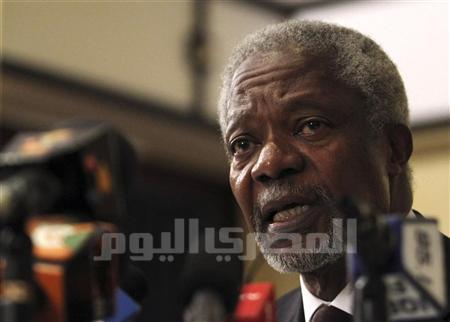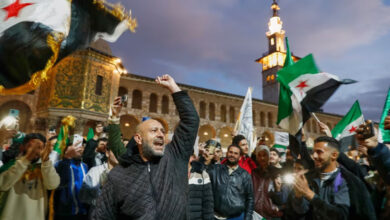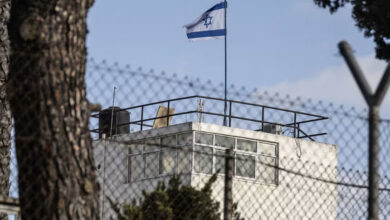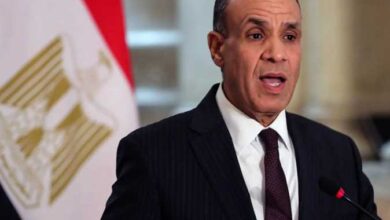
BEIRUT — International envoy and former UN chief Kofi Annan left Syria Sunday without a deal to end the bloody year-old conflict as regime forces mounted a new assault on rebel strongholds in the north.
Annan said he presented President Bashar al-Assad with concrete proposals "which will have a real impact on the ground."
"Once it's agreed, it will help launch the process and help end the crisis on the ground," he told reporters at the end of his two-day visit to Syria.
Annan, who also met with Syrian opposition leaders and businessmen in Damascus, said he was optimistic following two sets of talks with Assad, but acknowledged that resolving the crisis would be tough.
"It's going to be difficult but we have to have hope," he said.
The former UN chief called for reforms that would create "a solid foundation for a democratic Syria," but added: "You have to start by stopping the killing and the misery and the abuse that is going on today and then give time for a political settlement."
The ongoing bloodshed cast a pall over the UN efforts to end the country's yearlong conflict, with both the regime and the opposition refusing talks with the other.
In his discussions with Assad on Saturday, Annan made several proposals to end the political crisis and start a political dialogue. He was rebuffed by the president who rejected any immediate negotiations with the opposition, striking a further blow to already faltering international efforts for talks to end the conflict.
Assad told Annan that a political solution is impossible as long as "terrorist groups" threaten the country.
The opposition's political leadership has also rejected dialogue, saying talk is impossible after a crackdown that the UN estimates has killed more than 7,500 people. That makes it likely that the conflict will continue to edge toward civil war.
Annan left Syria later Sunday, headed for Qatar, a UN spokesman said on condition of anonymity in line with regulations.
Syrian forces, meanwhile, kept up an offensive against rebel strongholds in the north of the country and shelled neighborhoods in the restive central city of Homs, as well as clashing with rebel fighters across the country.
Military units loyal to Assad appear to have been freed up after finally crushing lightly armed rebels in the Homs neighborhood of Baba Amr last week, and are on the attack in Idlib province, across the border from key opposition supply bases in Turkey.
Troops on Saturday launched a long-anticipated assault to crush the opposition in Idlib province, bombarding its main city with tank shells from all sides and clashing with rebel fighters struggling to hold back an invasion.
Syrian forces had been building up for days around Idlib, the capital of a hilly, agricultural province along the Syria-Turkey border that has been a hotbed of protests against Assad's regime.
An AP photographer touring Turkish villages across the border from Idlib reported hearing constant artillery pounding. Turkish villagers said the artillery fire began just before dawn and that refugees were trickling in across the border into Turkey during lulls.
A Turkish official said the violence had led to a spike in Syrian civilians fleeing to Turkey. Some 1,000 have crossed the border in the past week as opposed to 1,000 in the previous month, the official said, speaking on condition of anonymity under government protocol.
Turkey now hosts some 12,500 Syrians, part of the more than 100,000 refugees who have fled to Turkey, Lebanon and Jordan.
The British-based Syrian Observatory for Human Rights, which relies on a network of activists on the ground in Syria, reported military arrests, raids in towns and villages across Syria as well as clashes with armed rebels.
In the north, three soldiers were killed in the village of Janoudieh near the Turkish border in clashes between troops and army defectors. A mother and her son were killed in the crossfire during another clash in the town of Ariha that also killed two soldiers. And four civilians were killed during an army raid of the village of Dabeet.
Others were killed in raids outside Damascus, the group said.
In Homs, several activists reported intense shelling of the Karm al-Zeytoun, Bab Dreib and Job al-Jandali districts with mortars and rocket propelled grenades and said several people were killed and wounded.
"There is very heavy destruction. Cars are burning and smoke is rising from the area," said Homs-based activist Abu Bakr Saleh.
"They are trying to punish all districts of Homs where anti-government protests still take place," he said.
Other activists said government forces shelled a bridge on a road to the Lebanese border often used by families fleeing violence. It was unclear if the bridge was destroyed.
The activist claims could not be independently verified. The Syrian government rarely comments on specific incidents inside the country and bars most media from operating.
Many fear the offensive in Idlib could end up like the regime's campaign against the rebel-held neighborhood of Baba Amr in Homs. Troops besieged and shelled Baba Amr for weeks before capturing it on 1 March.
Activists say hundreds were killed, and a UN official who visited the area this week said she was "horrified" by the destruction in the district, now virtually deserted.
In the northwestern city of Aleppo, gunmen assassinated local boxing champion Gheyath Tayfour. State-run news agency SANA said an armed group ambushed the 34-year-old Tayfour in his car near Aleppo University square and opened fire, killing him instantly with five bullets to his head.
Syria has seen a string of mysterious assassinations lately targeting doctors, professors and businessman, as the uprising against Assad turns more militarized.




